Zondervan Counterpoints Series Upgrade II (14 vols.)
Digital Logos Edition
Overview
Miracles, biblical inerrancy, hell, women in church leadership, creation, and the rapture—these are some key areas of concern for many in the Church. With dozens of contributing authors from various theological backgrounds, the Zondervan Counterpoints series is an invaluable set of resources for Christians today, focusing on these topics and more.
Each volume lays out multiple views on a particular theological matter, letting you draw your own conclusions on these contested issues. Respected biblical scholars and theologians present their views based on years of extensive research—so you know you’re hearing the strongest possible case for each perspective.
The advantage of this approach is huge. The thought-provoking articles give you the tools to lay a sound biblical foundation. Whether you are a student, pastor, teacher, youth worker, or layperson, these volumes are a fantastic tool for understanding contemporary Christian issues in the light of solid scriptural truth.
This collection is no longer available. Check out Zondervan Counterpoints Series (35 vols.).
- Provides numerous perspectives on key areas of concern for the modern Church
- Compares and critique multiple distinct views
- Includes contributions from a diverse assortment of distinguished scholars and theologians
- Title: Zondervan Counterpoints Collection Upgrade II
- Editor: Stanley N. Gundry
- Series: Zondervan Counterpoints
- Publisher: Zondervan
- Volumes: 14
- Pages: 4,046
- Christian Group: Evangelical
- Resource Type: Topical
- Topic: Theology
This title is included in the following collections
You can save when you purchase this product as part of a collection.
Zondervan Ultimate Collection ...
$21,970.44$16,474.99
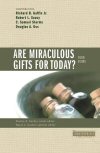
Are the gifts of tongues, prophecy, and healing for today? No, say cessationists. Yes, say Pentecostal and Third Wave Christians. Maybe, say a large sector of open-but-cautious evangelicals. Are Miraculous Gifts for Today? takes you to the heart of the charismatic controversy. It provides an impartial format for comparing the four main lines of thinking: cessationist, open-but-cautious, third wave, and Pentecostal/charismatic. The authors present their positions in an interactive setting that allows for critique, clarification, and defense. This thought-provoking book will help Christians on every side of the miraculous gifts debate to better understand their own position and the positions of others.
Contents:
- “A Cessationist View,” by Richard B. Gaffin Jr.
- “An Open but Cautious View” by Robert L. Saucy
- “A Third Wave View” by C. Samuel Storms
- “A Pentecostal/Charismatic View” by Douglas A. Oss
- “Conclusion” by Wayne A. Grudem
Wayne Grudem is a New Testament scholar, theologian, and author. He is research professor of Bible and theology at Phoenix Seminary, Arizona, where he moved in 2001 after having taught at Trinity Evangelical Divinity School for more than 20 years. He is the author of Systematic Theology: An Introduction to Biblical Doctrine, Politics according to the Bible: A Comprehensive Resource for Understanding Modern Political Issues in Light of Scripture, and Christian Beliefs; Twenty Basics Every Christian Should Know.
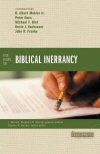
The inerrancy of the Bible is a current and often contentious topic among evangelicals. Five Views on Biblical Inerrancy represents a timely contribution by showcasing the spectrum of evangelical positions on inerrancy, facilitating understanding of these perspectives, particularly where and why they diverge. Each essay in this volume considers the present context and the viability and relevance for the contemporary evangelical Christian witness and whether and to what extent Scripture teaches its own inerrancy. Five Views on Biblical Inerrancy serves not only as a single-volume resource for surveying the current debate, but also as a catalyst for understanding and advancing the conversation.
Contents:
- “When the Bible Speaks, God Speaks: The Classic Doctrine of Biblical Inerrancy” by R. Albert Mohler Jr.
- “Inerrancy, However Defined, Does Not Describe What the Bible Does” by Peter Enns
- “Inerrancy Is Not Necessary for Evangelicalism outside the USA” by Michael F. Bird
- “Augustinian Inerrancy: Literary Meaning, Literal Truth, and Literate Interpretation in the Economy of Biblical Discourse” by Kevin J. Vanhoozer
- “Recasting Inerrancy: The Bible As Witness to Missional Plurality” by John R. Franke
- “Conclusion: Opening Lines of Communication” by Stephen M. Garrett and J. Merrick
James R.A. Merrick is an Anglican minister who earned his MA in Christian thought and ThM in church history from Trinity Evangelical Divinity School.
Stephen M. Garrett is associate professor of the philosophy of religion at Lithuania University of Educational Sciences.
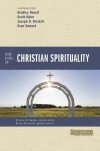
Amid a culture that is both fascinated by spirituality and inundated by a dizzying variety of options for pursuing it, many Christians long for a deeper, more historically rooted spiritual life. In Four Views on Christian Spirituality, editor Bruce Demarest presents an invaluable resource for study and comparison of the major Christian perspectives on spiritual formation. Essays on Eastern Orthodoxy, Roman Catholicism, evangelicalism, and liberal Protestantism, collected side-by-side, easily allow for the beliefs of each viewpoint to be thoughtfully considered. In the end, an increased familiarity with each of the different schools of Christian thought will aid readers seeking spiritual transformation for themselves, their family members, and their churches.
Contents:
- “Orthodox Spirituality: A Quest for Transfigured Humanity” by Bradley Nassif
- “‘Come to the Father’: The Fact At the Foundation of Catholic Spirituality” by Scott Hahn
- “The Progressive Face of Mainline Protestant Spirituality” by Joseph Driskill
- “Evangelical Spirituality” by Evan Howard
Bruce A. Demarest was educated at Wheaton College and Trinity Evangelical Divinity School. A professor at Denver Seminary, he is the author of more than a dozen books, including Dictionary of Everyday Theology and Culture, The Cross and Salvation: The Doctrine of Salvation, and Integrative Theology.
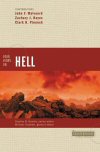
Most contemporary Christians acknowledge the doctrine of hell, but they’d rather not think about how God punishes the wicked. Four Views on Hell meets this subject head-on with different views on what Scriptures says. Is hell to be understood literally as a place of eternal smoke and flames? Or are such images simply metaphors for a real but different form of punishment? Is there such a thing as “conditional immortality,” in which God annihilates the souls of the wicked rather than punishing them endlessly? Is there a purgatory, and if so, how does it fit into the picture? This volume allows the reader to see the four views on hell—literal, metaphorical, conditional, and purgatorial—in interaction with each other. Each view in turn is presented, critiqued, and defended. This evenhanded approach is ideal for comparing and contrasting views in order to form a personal conclusion about one of Christianity’s key doctrines.
Contents:
- “The Literal View” by John F. Walvoord
- “The Metaphorical View” by William V. Crockett
- “The Purgatorial View” by Zachary J. Hayes
- “The Conditional View” by Clark H. Pinnock
William V. Crockett earned his PhD from the University of Glasgow and lectures and writes on contemporary theological issues.
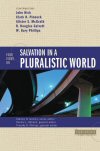
Religious pluralism is the greatest challenge facing Christianity in today's Western culture. The belief that Christ is the only way to God is being challenged and, increasingly, Christianity is seen as just one among many valid paths to God. In Four Views on Salvation in a Pluralistic World, four perspectives are presented and defended by one of their proponents, and then critiqued.
Contents:
- “A Pluralist View” by John Hick
- “An Inclusivist View” by Clark H. Pinnock
- “A Particularist View: A Post-Enlightenment Approach” by Alister E. McGrath
- “A Particularist View: An Evidentialist Approach” by R. Douglas Geivett and W. Gary Phillips
Dennis L. Okholm is a Benedictine oblate who speaks frequently in church and youth group settings, and serves as assistant pastor at Holy Trinity Anglican Church in Costa Mesa, California. He is also professor of theology at Azusa Pacific University and adjunct professor at Fuller Theological Seminary. Okholm is the author or editor of many books, including Monk Habits for Everyday People, The Gospel in Black and White, and Evangelicals and Scripture: Tradition, Authority, and Heremeneutics.
Timothy R. Phillips was associate professor of historical and systematic theology at Wheaton College, where he was instrumental in starting and organizing the annual Wheaton College Theology Conference. He is also the coeditor of Christian Apologetics in the Postmodern World, Care for the Soul: Exploring the Intersection of Psychology and Theology, and The Nature of Confession.
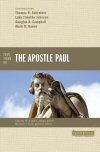
The apostle Paul was a vital force in the development of Christianity. Paul’s historical and religious context affects the theological interpretation of Paul’s writings—no small issue in the whole of Christian theology. Recent years have seen much controversy about the apostle Paul, his religious and social context, and its effects on his theology. In the helpful Counterpoints format, four scholars present their views on the best framework for describing Paul’s theological perspective, including his view of salvation, the significance of Christ, and his vision for the churches.
General editor and New Testament scholar Michael F. Bird covers foundational issues and provides helpful summaries in his introduction and conclusion. New Testament scholars, pastors, and students of Christian history and theology will find Four Views on the Apostle Paul an indispensable introduction to ongoing debates on the Apostle Paul’s life and teaching.
Contents:
- “Paul: A Reformed Reading” by Thomas R. Schreiner
- “The Paul of the Letters: A Catholic Perspective” by Luke Timothy Johnson
- “Christ and the Church in Paul: A ‘Post-New Perspective’ Account” by Douglas A. Campbell
- “A Jewish View” by Mark D. Nanos
Michael F. Bird is lecturer in theology at Ridley Melbourne College of Mission and Ministry. He is the author of several books, including Evangelical Theology, The Saving Righteousness of God, and with James Crossley, How Did Christianity Begin?
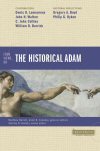
As a part of the Zondervan Counterpoints series, Four Views on the Historical Adam clearly outlines four views on Adam as presented by top-notch evangelical scholars of each view. You will come away with a better understanding of the key biblical and theological issues at stake and of the implications of Adam for contemporary Christian witness and church life.
Contents:
- “Adam, To Be or Not To Be?” by Matthew Barrett and Ardel B. Caneday
- “No Historical Adam: Evolutionary Creation View” by Denis O. Lamoureux
- “A Historical Adam: Archetypal Creation View” by John H. Walton
- “A Historical Adam: Old-Earth Creation View” by C. John Collins
- “A Historical Adam: Young-Earht Creation View” by William D. Barrick
- “Whether or Not There Was a Historical Adam, Our Faith Is Secure” by Gregory A. Boyd
- “We Cannot Understand the World or Our Faith without a Real, Historical Adam” by Philip G. Ryken
Matthew Barrett is assistant professor of Christian studies at California Baptist University. He earned his PhD in systematic theology and MDiv in Christian studies from The Southern Baptist Theological Seminary. He is the editor of Credo magazine and, with Thomas Nettles, Whomever He Wills: A Surprising Display of Sovereign Mercy.
Ardel Caneday is professor of New Testament studies and Greek at the University of Northwestern in St. Paul, Minnesota.
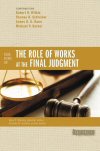
Four Views on the Role of Works at Final Judgment takes up the age-old question: What must I do to be saved? Four leading scholars interact with the degree to which one’s works are considered at the final judgment.
Contents:
- “Christian Will Be Judged according to Their Works at the Rewards Judgment, but Not at the Final Judgment” by Robert N. Wilkin
- “Justification apart from and by Works: At the Final Judgment Works Will Confirm Justification” by Thomas R. Schreiner
- “If Paul Could Believe Both in Justification by Fiaht and Judgment according to Works, Why Should That Be a Problem for Us?” by James D.G. Dunn
- “A Catholic Perspective: Our Works Are Meritorious at the Final Judgment Because of Our Union With Christ by Grace” by Michael P. Barber
- “The Puzzle of Salvation by Grace and Judgment by Works” by Alan P. Stanley
Alan P. Stanley received his ThM and PhD in New Testament from Dallas Theological Seminary. In 2003, he moved to Sunshine Coast, Queensland, Australia where he is a pastor and teaches the Bible at Mueller College of Ministries. He is the author of Salvation is More Complicated than You Think.
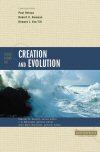
For Christians, the issues raised by the different views on creation and evolution are challenging. Can a young earth be reconciled with a universe that appears to be billions of years old? Does scientific evidence point to a God who designed the universe and life in all its complexity? Three Views on Creation and Evolution deals with these and similar concerns as it looks at three dominant schools of Christian thought. Proponents of young earth creationism, old earth creationism, and theistic evolution each present their different views, tell why the controversy is important, and describe the interplay between their understandings of science and theology.
Contents:
- “Young Earth Creationism” by Paul Nelson and John Mark Reynolds
- “Progressive Creationism” by Robert C. Newman
- “The Fully Gifted Creation” by Howard J. van Till
J.P. Moreland is a distinguished professor of philosophy at Biola University’s Talbot School of Theology, and the director of Eidos Christian Center. He has written more than 100 articles in magazines and journals and authored or coauthored over 20 books, including Love Your God with All Your Mind and Scaling the Secular City: A Defense of Christianity. He is also coeditor of The Apologetics Study Bible.
John Mark Reynolds is the chief academic officer at Houston Baptist University. He is the author of When Athens Met Jerusalem: An Introduction to Classical and Christian Thought.
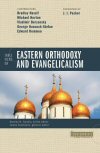
To some Western evangelicals, the practices of Eastern Orthodoxy seem mysterious and perhaps even unbiblical. Then again, from an Orthodox perspective, evangelicals lack the spiritual roots provided by centuries-old church traditions. Are the differences between these two branches of Christianity so sharp that to shake hands is to compromise the gospel itself? Or is there room for agreement? Are Eastern Orthodoxy and evangelicalism at all compatible? Yes, no, maybe—this book allows five leading authorities to present their different views, have them critiqued by their fellow authors, and respond to the critiques.
Contents:
- “Are Eastern Orthodoxy and Evangelicalism Compatible? Yes: The Evangelical Theology of the Eastern Orthodox Church” by Bradley Nassif
- “Are Eastern Orthodoxy and Evangelicalism Compatible? No: An Evangelical Perspective” by Michael Horton
- “Are Eastern Orthodoxy and Evangelicalism Compatible? No: An Orthodox Perspective” by Vladimir Berzonsky
- “Are Eastern Orthodoxy and Evangelicalism Compatible? Maybe: An Evangelical Perspective” by George Hancock-Stefan
- “Are Eastern Orthodoxy and Evangelicalism Compatible? Maybe: An Orthodox Perspective” by Edward Rommen
James J. Stamoolis holds a ThD from the University of Stellenbosch, South Africa and has taught in theological colleges in southern Africa. He is the author of Eastern Orthodox Mission Theology Today. Stamoolis is currently the North American director of the Caspari Center for Biblical and Jewish Studies.
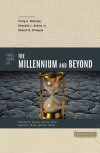
Are these the last days? Could Jesus return at any time to establish a thousand-year reign on earth? What is the nature of Christ’s millennial kingdom referred to in the book of Revelation? What must happen before Jesus returns, and what part does the church play? Three predominant views held by evangelicals seek to answer these and related questions: premillennial, postmillennial, and amillennial. This book gives each view a forum for presentation, critique, and defense.
Besides each contributor’s personal perspective, various interpretations of the different positions are discussed in the essays. Three Views on the Millennium and Beyond lets you compare and contrast three important eschatological viewpoints to gain a better understanding of how Christianity’s great hope, the return of Jesus, is understood by the church.
Contents:
- “Postmillennialism” by Kenneth L. Gentry Jr.
- “Amillennialism” by Robert B. Strimple
- “Premillennialism” by Craig A. Blaising
Darrell L. Bock is research professor of New Testament studies and professor of spiritual development and culture at Dallas Theological Seminary. His publications include Studying the Historical Jesus: A Guide to Sources and Methods, Jesus according to Scripture, and Breaking the Da Vinci Code. Bock serves as editor-at-large for Christianity Today, and is on the board of Chosen People Ministries and Wheaton College. From 2000 to 2001, Dr. Bock served as president of the Evangelical Theological Society.
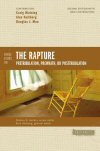
The rapture is a contested doctrine among evangelicals. Scholars generally hold one of three perspectives on the timing of and circumstances surrounding the rapture, all of which are presented in Three Views on the Rapture. The recent prominence of a pre-wrath understanding of the rapture calls for a fresh examination of this important but contested Christian belief. Alan D. Hultberg explains the pre-wrath view; Craig Blaising defends the pre-Tribulation view; and Douglas Moo sets forth the post-Tribulation view. Each author provides a substantive explanation of his position, which is critiqued by the other two authors. A thorough introduction gives a historical overview of the doctrine of the rapture and its effects on the church.
Contents:
- “A Case for the Pretribulation Rapture” by Craig Blaising
- “A Case for the Prewrath Rapture” by Alan Hultberg
- “A Case for Posttribulation Rapture” by Douglas Moo
Alan Hultberg is associate professor of Bible exposition and New Testament at the Talbot School of Theology at Biola University.
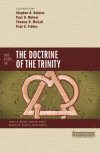
The doctrine of the Trinity stands front and center of the Christian faith and its articulation. After a sustained drought of trinitarian engagement, the doctrine of the Trinity has increasingly resurged to the forefront of Evangelical confession. The second half of the twentieth century, however, saw a different kind of trinitarian theology developing, giving way to what has commonly been referred to as the “social Trinity.”
In this volume, leading contributors—one evangelical and one mainline/catholic representing each view—establish their models and approaches to the doctrine of the Trinity, each highlighting the strengths of his view in order to argue how it best reflects the orthodox perspective. In order to facilitate a genuine debate and to make sure that the key issues are teased out, each contributor addresses the same questions regarding their trinitarian methodology, doctrine, and its implications.
Contents:
- “Classical Trinity: Evangelicalism Perspective” by Stephen R. Holmes
- “Classical Trinity: Catholic Perspective” by Paul D. Molnar
- “Relational Trinity: Creedal Perspective” by Thomas H. McCall
- “Relational Trinity: Radical Perspective” by Paul S. Fiddes
Jason S. Sexton earned his PhD from the University of St. Andrews and is a minister in the Evangelical Free Church of America. He is the author of The Trinitarian Theology of Stanley J. Grenz.
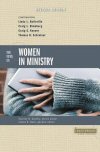
What does the Bible say about women’s roles in the church? This book furnishes you with a clear and thorough presentation of the two primary views on women in ministry so you can better understand each one’s strengths, weaknesses, and complexities. Each view—egalitarian and complementarian—is represented by two contributors.
Each author states his or her case and is then critiqued by the other. The fair-minded, interactive Counterpoints forum allows you to compare and contrast the two different positions, and to form your own opinion concerning the practical and often deeply personal issue of women in ministry.
Contents:
- “An Egalitarian Perspective” by Linda L. Belleville
- “A Complementarian Perspective” by Craig L. Blomberg
- “Another Egalitarian Perspective” by Craig S. Keener
- “Another Complementarian Perspective” by Thomas R. Schreiner
James R. Beck is senior professor of counseling at Denver Seminary. He is the author of The Human Person in Theology and Psychology: A Biblical Anthropology for the Twenty-first Century.
Reviews
2 ratings

Scott J Sherwood
5/23/2016
Anthony Sims
7/7/2015